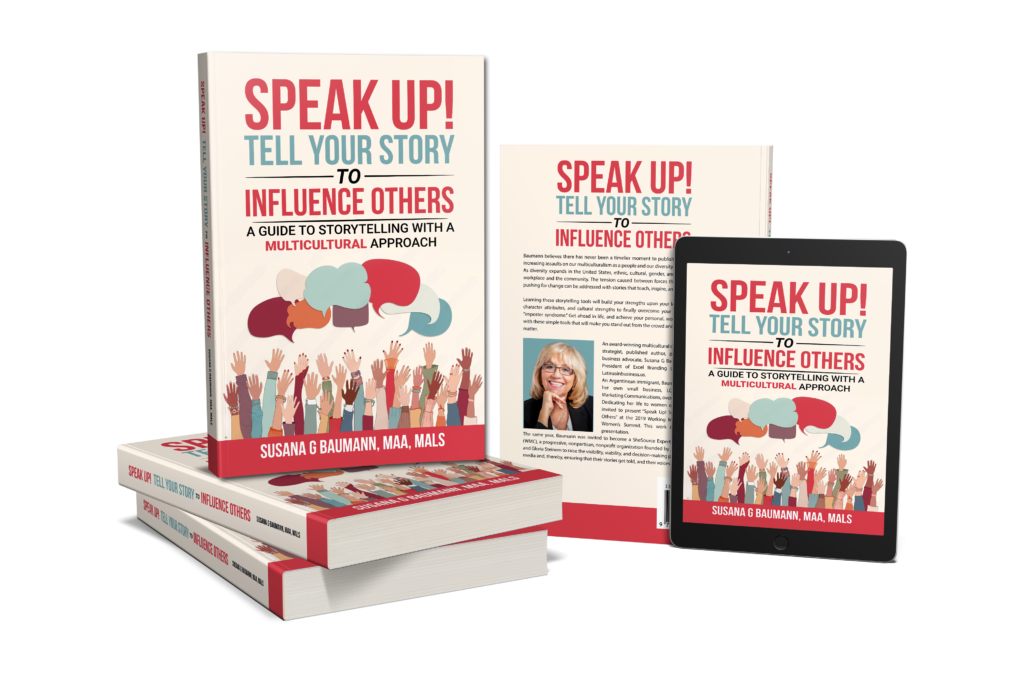In today’s competitive landscape, having a strong personal brand is not just an asset—it’s a necessity. Stories about your journey, vulnerabilities, and strengths define your personal brand. But controlling the narrative while selecting the message you’d like to convey will best reveal your personal brand. The message you choose for yourself, not the one others decide for you.
Here are 3 questions to help you find out if your personal brand is strong and recognizable.
(If you think something is missing, or you are not happy with your answers below, I invite you to check my new book, “Speak Up! Tell Your Story to Influence Others.” You will find a step-by-step guide to empower your self-awareness journey and help you build a strong personal brand.)
What is a personal brand?
Your personal brand is the “intentional” way you present yourself to the world in any environment, not only business, in order to communicate your vision and life purpose. Defining a brand includes:
· your image, physical appearance, and demeanor;
· character traits such as your behaviors, including your ethics, morals, and values;
· cultural attributes such as your personality, thoughts, experiences, and emotional patterns;
· your leadership skills, formal or informal education, expertise, general or specific knowledge in your industry;
· your experience, the exposure to several circumstances, and the learning effect that they might have had on you;
· the messages you’d like to convey.
As you see, many factors come into play when building a recognizable personal brand. How do you know then if yours is strong and effective? Here are three key questions to help you evaluate it:
1. Does your personal brand present you as remarkable and unique?
The combination of your qualities, strengths, and weaknesses is what makes you remarkable and unique, and should be reflected in your personal brand statement, the core of your personal brand. It’s what sets you apart from others in your field. You can start building your brand statement when you have developed a certain degree of self-awareness and can take control over your story.
To assess it, ask yourself:
– Does my personal brand statement include my values, character traits, and cultural attributes?
– Does my voice clearly reflect my leadership skills?
– Can I clearly articulate my personal brand statement in a sentence or two?
A strong personal brand statement should be concise, compelling, and consistent across all your professional platforms, from your resume and LinkedIn profile to your personal website and social media accounts.
2. Do others perceive you the way you intend?
Perception is reality when it comes to personal brand. It’s crucial to ensure that the way you intend to present yourself aligns with how others actually perceive you.
If you were to ask your family, friends, and colleagues who you are, what would they say? Each of them might have a completely different response.
Let’s start with your family. Your parents have been with you since your birth. They are the people who have known you the longest -not necessarily the ones who know you best. Your parents might see you under the light of their expectations, while your children might consider you as a reference. Your siblings will have different perspectives, whether you are older or younger than them.
Your teachers from school might remember you if you were an exceptionally dedicated student or a troublemaker. Your favorite professors in college may recall your participation as a learner or your inquisitive mind.
How your friends perceive you depends on when or where you met them, the experiences you shared with them, or what walk of life they come from.
Finally, your colleagues at work will have a different opinion on who you are, your behaviors, and your capabilities. Your clients might see you in the light of the value you offer them, while your boss probably perceives the value and abilities you bring to the company.
In truth, the combination of these views is what makes you unique. What kind of result would you get if you mixed all of them in a blender? What flavor? What color? What taste?
Reflect on the following:
– Have you asked for feedback from colleagues, mentors, or friends about your brand?
– Are there consistent themes in how people describe you and your work?
– Do your online presence and offline interactions reinforce the same message?
Gathering feedback and making necessary adjustments helps ensure that your personal brand is not only clear to you but also to those you want to influence.
3. Are you consistently communicating your personal brand message with authenticity?
Consistency is key to a strong personal brand. Your actions, communications and the content you share should all reinforce your brand message. Consider these points:
– Do your social media posts, professional engagements, and public appearances reflect your personal brand values, character traits, and cultural attributes?
– Are you regularly revisiting your leadership skills and knowledge to stay relevant and authentic?
– Do you follow through on your promises and maintain a professional image in all your dealings?
Consistent communication and authenticity build trust and credibility, which are essential components of a strong personal brand.
By asking yourself these questions, you can gain valuable insights into the strength and effectiveness of your personal brand. A well-defined, accurately perceived, and consistently communicated personal brand can open doors to new opportunities and set you on a path to professional success. So take the time to evaluate and refine your personal brand—it’s an investment that will pay off in the long run.
Share your information to schedule a 30-minute consultation with Susana:
